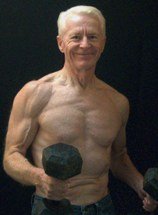


In today's March 1, 2011 newsletter . . .
Big Bellies Can Lead to DementiaWhen I see fat people – and there are so many these days it’s hard not to see them – I often wonder what it would take to motivate them to lose weight. Does that sound mean or condescending? As a fitness advocate, I'm supposed to wonder about these things.I know that fat people really don’t want to be fat. I don’t think anybody does. I know they struggle with the problem. But if personal pride in their appearance isn’t a strong enough reason to get fit, what is? Fear is one thing that can do it. I've seen it. Watch somebody trim down after having survived a life threatening event like a heart attack. They naturally fear another one. But how about the fear of dementia? People I talk to dread that condition as much as any dark thought they can imagine. The thing is I don’t think most people associate fatness with dementia. Yeah, being fat is bad for my heart. But dementia? Never heard that before. Well the threat is real. Web MD, as one example, suggests that big bellies increase the risk of dementia (report here). And you don't have to be terribly overweight to be at risk. Just an accumulation of belly fat spells trouble. When we add dementia to heart disease, diabetes, and certain cancers, maybe those super-sized meals aren’t so attractive after all. What’s the magic pill? It’s the same as it has always been: push yourself away from the dinner table sooner and move more. Years ago, during a lunch break at a cross-country ski school, Eric, the instructor was surveying the sad physical condition of many of his students. As they gorged themselves, he dined on a piece of cheese on whole grain bread and an orange. He said to me, "Logan, some people eat to live; others live to eat." Or as Jack LaLanne was so fond of saying: "Your waistline is your lifeline." Need help? It can begin right here.  Can the Lowly Push-Up Save Your Shoulders?Most young guys who workout love bench pressing. You’ve heard it: "He works out? How much can he bench?"Years ago, I was regular bench presser. But there came a time when it started bothering my shoulders. At first, I thought it must be standing overhead pressing. But it was the bench press. I tried varying the angle of the bench and switching from a barbell to dumbbells. Some of it helped and I could work around the problem, to a degree. But finally, the frequent soreness made the movement more trouble than it was worth. I rested the area and when all pain had gone away, I gingerly began doing standard push-ups. And guess what? No problems. I got brave and figured I’d try bench presses again. Bad idea. They still bothered my shoulders. It has been years now since I’ve experienced any shoulder aches. I do a variety of push-ups, included weighted push-ups, chest presses with resistance bands, dive bombers, and others without a hint of shoulder soreness. If you get sore shoulders from bench pressing, don’t be stubborn. Dump them! There are too many good options that will do the job for you – pain free. Will simply switching to push-ups work? You won't know until you try. See weighted push-ups.
You've probably heard about the tremendous benefits of weight training and how you can retain -- or even reclaim -- the attributes of youth . . . Discover the way with . . . Gray Iron: A Fitness Guide for Senior Men and Women Newsletter Policy The Gray Iron Fitness Newsletter is a free publication sent twice monthly to subscribers. The purpose is to provide honest and realistic fitness information for people age 50 and above. I have never been paid or received compensation of any kind to write a positive review or endorse a product. If I say that I personally use a product or service, it is because I find value in it and have paid for it with my own money. Like newspapers, magazines and television, this newsletter and my web site contain advertising and marketing links. Naturally, I am compensated for these. The newsletter and web site provide information to help users establish and maintain a fitness lifestyle. But fitness information is not the same as fitness advice, which is the application of exercise and dietary practices to an individual's specific circumstances. Therefore, always consult with your physician for assurance that fitness information, and your interpretation of it, is appropriate for you. Your comments and questions are always appreciated. Sincerely, Logan Franklin |